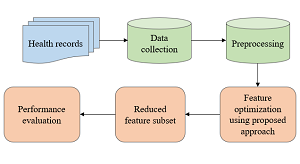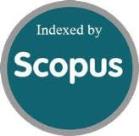A Novel Hybrid Approach for Feature Selection in Cardiovascular Risk Assessment
DOI:
https://doi.org/10.46604/aiti.2024.13972Keywords:
machine learning, support vector machine, ACOHC, hill climbing, ant colony optimizationAbstract
Early detection of cardiac risk is crucial for accurate diagnosis and treatment of fatal cardiovascular diseases. Selecting relevant features is essential for machine learning in building an effective decision support system of cardiovascular risk assessment, ensuring accuracy of high-dimensional data. This study aims to propose a novel hybrid feature selection approach, termed ant colony optimization with hill climbing (ACOHC), integrating ant colony optimization (ACO) and hill climbing (HC) algorithms. The accuracy metric and various classifiers are deployed to evaluate the effectiveness. Additionally, comparisons are made with nine alternative feature selection techniques. The feature subset identified through the ACOHC attains a classification accuracy of 95.1% with the support vector machine classifier.
References
V. P. Kavitha, V. Janarthanan, T. Annamalai, and M. Arumugam, “Enhancing Healthcare in the Digital Era: A Secure E-Health System for Heart Disease Prediction and Cloud Security,” Expert Systems with Applications, vol. 255, part A, article no. 124479, December 2024.
O. Gaidai, Y. Cao, and S. Loginov, “Global Cardiovascular Diseases Death Rate Prediction,” Current Problems in Cardiology, vol. 48, no. 5, article no. 101622, May 2023.
R. Bharti, A. Khamparia, M. Shabaz, G. Dhiman, S. Pande, and P. Singh, “Prediction of Heart Disease Using a Combination of Machine Learning and Deep Learning,” Computational Intelligence and Neuroscience, vol. 2021, article no. 8387680, 2021.
A. Hutke and J. Deshmukh, “A Systematic Review of Machine Learning Approaches and Missing Data Imputation Techniques for Predicting Heart Disease,” International Conference on Advanced Computing Technologies and Applications, pp. 1-5, October 2023.
H. Rao, X. Shi, A. K. Rodrigue, J. Feng, Y. Xia, M. Elhoseny, et al., “Feature Selection Based on Artificial Bee Colony and Gradient Boosting Decision Tree,” Applied Soft Computing, vol. 74, pp. 634-642, January 2019.
A. Bhattacharya, R. T. Goswami, K. Mukherjee, and N. G. Nguyen, “An Ensemble Voted Feature Selection Technique for Predictive Modeling of Malwares of Android,” International Journal of Information System Modeling and Design, vol. 10, no. 2, pp. 46-69, 2019.
M. Ahsan and Z. Siddique, “Machine Learning-Based Heart Disease Diagnosis: A Systematic Literature Review,” Artificial Intelligence in Medicine, vol. 128, article no. 102289, June 2022.
A. K. Gárate-Escamila, A. H. El Hassani, and E. Andrès, “Classification Models for Heart Disease Prediction Using Feature Selection and PCA,” Informatics in Medicine Unlocked, vol. 19, article no. 100330, 2020
U. Moorthy and U. D. Gandhi, “A Novel Optimal Feature Selection Technique for Medical Data Classification Using ANOVA Based Whale Optimization,” Journal of Ambient Intelligence and Humanized Computing, vol. 12, no. 3, pp. 3527-3538, March 2021.
R. Aggrawal and S. Pal, “Sequential Feature Selection and Machine Learning Algorithm-Based Patient’s Death Events Prediction and Diagnosis in Heart Disease,” SN Computer Science, vol. 1, no. 6, article no. 344, November 2020.
M. A. Sulaiman and J. Labadin, “Feature Selection Based on Mutual Information,” 9th International Conference on IT in Asia, pp. 1-6, August 2015.
S. Kaushik, A. Choudhury, A. K. Jatav, N. Dasgupta, S. Natarajan, L. A. Pickett, et. al., “Comparative Analysis of Features Selection Techniques for Classification in Healthcare,” Lecture Notes in Computer Science, in press.
S. Tabakhi, P. Moradi, and F. Akhlaghian, “An Unsupervised Feature Selection Algorithm Based on Ant Colony Optimization,” Engineering Applications of Artificial Intelligence, vol. 32, pp. 112-123, June 2014.
Purushottam, K. Saxena, and R. Sharma, “Efficient Heart Disease Prediction System,” Procedia Computer Science, vol. 85, pp. 962-969, 2016.
M. A. Jabbar, B. L. Deekshatulu, and P. Chandra, “Prediction of Heart Disease Using Random Forest and Feature Subset Selection,” Proceedings of the 6th International Conference on Innovations in Bio-inspired Computing and Applications, pp. 187-196, December 2015.
W. Wiharto, H. Kusnanto, and H. Herianto, “Interpretation of Clinical Data Based on C4.5 Algorithm for the Diagnosis of Coronary Heart Disease,” Healthcare Informatics Research, vol. 22, no. 3, pp. 186-195, 2016.
A. U. Haq, J. P. Li, M. H. Memon, S. Nazir, and R. Sun, “A Hybrid Intelligent System Framework for the Prediction of Heart Disease Using Machine Learning Algorithms,” Mobile Information Systems, vol. 2018, article no. 3860146, 2018.
Y. Khourdifi and M. Bahaj, “Heart Disease Prediction and Classification Using Machine Learning Algorithms Optimized by Particle Swarm Optimization and Ant Colony Optimization,” International Journal of Intelligent Engineering and Systems, vol. 12, no. 1, pp. 242-252, 2019.
A. Jain, S. Tiwari, and V. Sapra, “Two-Phase Heart Disease Diagnosis System Using Deep Learning,” International Journal of Control and Automation, vol. 12, no. 5, pp. 558-573, 2019.
L. Ali, A. Rahman, A. Khan, M. Zhou, A. Javeed, and J. A. Khan, “An Automated Diagnostic System for Heart Disease Prediction Based on χ2 Statistical Model and Optimally Configured Deep Neural Network,” IEEE Access, vol. 7, pp. 34938-34945, 2019.
M. Abdar, W. Książek, U. R. Acharya, R. S. Tan, V. Makarenkov, and P. Pławiak, “A New Machine Learning Technique for an Accurate Diagnosis of Coronary Artery Disease,” Computer Methods and Programs in Biomedicine, vol. 179, article no. 104992, October 2019.
M. S. Amin, Y. K. Chiam, and K. D. Varathan, “Identification of Significant Features and Data Mining Techniques in Predicting Heart Disease,” Telematics and Informatics, vol. 36, pp. 82-93, March 2019.
P. Theerthagiri and J. Vidya, “Cardiovascular Disease Prediction Using Recursive Feature Elimination and Gradient Boosting Classification Techniques,” Expert Systems, vol. 39, no. 9, article no. e13064, November 2022.
D. Tian and Z. Shi, “MPSO: Modified Particle Swarm Optimization and Its Applications,” Swarm and Evolutionary Computation, vol. 41, pp. 49-68, August 2018.

Published
How to Cite
Issue
Section
License
Copyright (c) 2024 Ankush Hutke, Jyoti Deshmukh

This work is licensed under a Creative Commons Attribution-NonCommercial 4.0 International License.
Submission of a manuscript implies: that the work described has not been published before that it is not under consideration for publication elsewhere; that if and when the manuscript is accepted for publication. Authors can retain copyright in their articles with no restrictions. is accepted for publication. Authors can retain copyright of their article with no restrictions.
Since Jan. 01, 2019, AITI will publish new articles with Creative Commons Attribution Non-Commercial License, under The Creative Commons Attribution Non-Commercial 4.0 International (CC BY-NC 4.0) License.
The Creative Commons Attribution Non-Commercial (CC-BY-NC) License permits use, distribution and reproduction in any medium, provided the original work is properly cited and is not used for commercial purposes.







